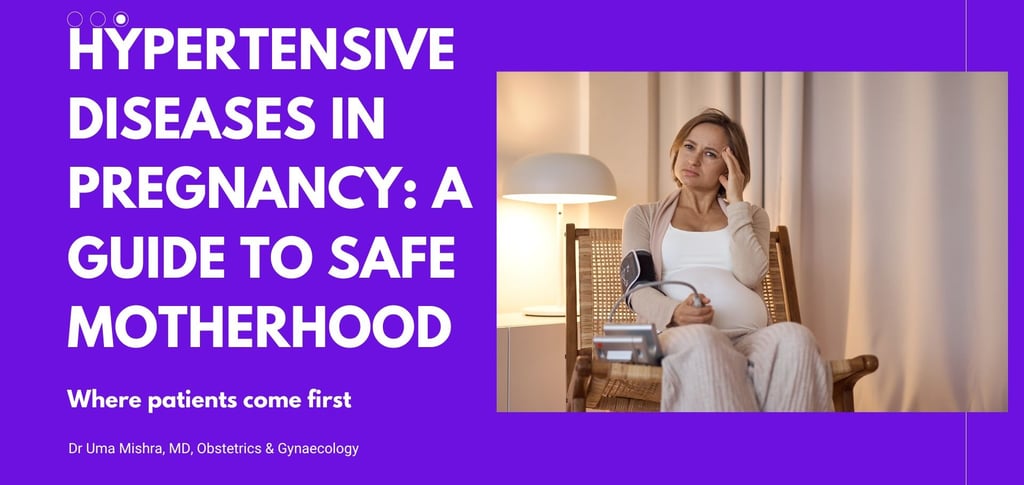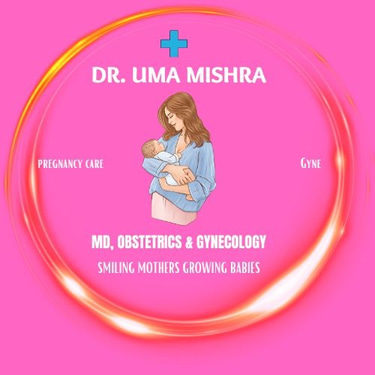Managing Hypertensive Diseases in Pregnancy: Causes, Remedies, and Expert Gynecological Care
Managing Hypertensive Diseases in Pregnancy: Causes, Remedies, and Expert Gynecological Care by Dr Uma Mishra, Gynecologist in Noida
Dr Uma Mishra, Gynecologist
5/9/20243 min read


Hypertensive Diseases in Pregnancy: A Guide to Safe Motherhood
High blood pressure during pregnancy, known as hypertensive disorders, can affect both mother and baby. This article explores the different types, underlying causes, and ways to manage these conditions with the help of expert gynecologists. By understanding these factors and taking proactive steps, pregnant women can navigate these challenges and enjoy a healthy pregnancy.
Types of Hypertensive Disorders in Pregnancy:
Gestational Hypertension: This occurs for the first time during pregnancy and usually resolves after birth.
Preeclampsia: This is a more serious condition involving high blood pressure and signs of damage to other organs, often accompanied by protein in the urine.
Eclampsia: A rare but life-threatening complication of preeclampsia, causing seizures.
Risk Factors:
Several factors increase the risk of hypertensive disorders:
Pre-existing conditions: Chronic high blood pressure, diabetes, kidney disease.
First pregnancy (Primigravida).
Family history of these disorders.
Obesity before or during pregnancy.
Placental problems affecting development or function
Let's discuss these risk factors in details for each of these factors :
1. Pre-existing conditions:
- Chronic high blood pressure (hypertension), diabetes, and kidney disease are all medical conditions that can predispose a woman to developing hypertension during pregnancy. These conditions may already strain the cardiovascular system and kidneys, increasing the risk of complications during gestation.
2. First pregnancy (Primigravida):
- Women experiencing their first pregnancy (primigravida) have a higher risk of developing hypertension compared to women who have had previous pregnancies. This increased risk is likely due to the body's adaptation to the physiological changes of pregnancy, which can sometimes lead to hypertension.
3. Family history:
- A family history of chronic conditions such as hypertension, diabetes, or kidney disease can indicate a genetic predisposition to these conditions. Genetic factors can influence susceptibility to developing hypertension during pregnancy.
4. Obesity:
- Obesity, especially before or during pregnancy, is a significant risk factor for developing hypertension during gestation. Obesity can contribute to metabolic changes and increased inflammation, which can affect vascular health and increase the likelihood of developing hypertension.
5. Placental problems:
- Placental problems, such as placental insufficiency or placental abruption, can impact the development and function of the placenta. The placenta plays a crucial role in maintaining normal blood pressure during pregnancy. Any disruptions in placental function can potentially lead to hypertension or preeclampsia.
Each of these factors contributes to the overall risk profile for hypertension during pregnancy. It's important for healthcare providers to monitor pregnant women closely, especially those with these risk factors, to detect and manage hypertension early to reduce the risk of complications for both the mother and baby.
Expert Gynecological Care is Key:
Gynecologists play a vital role in managing hypertensive disorders:
Early Detection: Regular blood pressure checks, urine tests, and other monitoring throughout pregnancy help identify any issues early.
Personalized Treatment Plans: Depending on the severity, these may include medication, lifestyle adjustments, and close monitoring of both mother and baby's health.
Prompt Intervention: Early action by your gynecologist can prevent serious complications like eclampsia or premature birth.
Collaborative Care: Gynecologists work with other specialists like obstetricians, cardiologists, and nephrologists to provide comprehensive care.
Empowering Yourself for a Healthy Pregnancy:
Even with these risks, proactive measures can improve outcomes:
Regular Prenatal Care: Attending all appointments allows for consistent monitoring of blood pressure, weight gain, and overall health.
Healthy Habits: A balanced diet, regular exercise (approved by your doctor), and avoiding smoking and excessive alcohol are crucial.
Medication Adherence: If prescribed medication, take it exactly as your gynecologist advises.
Know the Warning Signs: Be familiar with preeclampsia symptoms (high blood pressure, swelling, headaches, vision changes) and report any concerns to your doctor immediately.
Thus, Hypertensive disorders in pregnancy require careful management with expert guidance. Understanding the risks, seeking timely care, and adopting healthy habits empower expectant mothers to navigate these challenges confidently. This approach leads to a safer and more fulfilling pregnancy journey for both mom and baby.
#PregnancyHealth #Hypertension #GynecologyCare #HealthyMomHealthyBaby #PregnancyTips #PrenatalCare #PregnancyWellness #GynecologistNoida #BestPregnancyCareNoida
